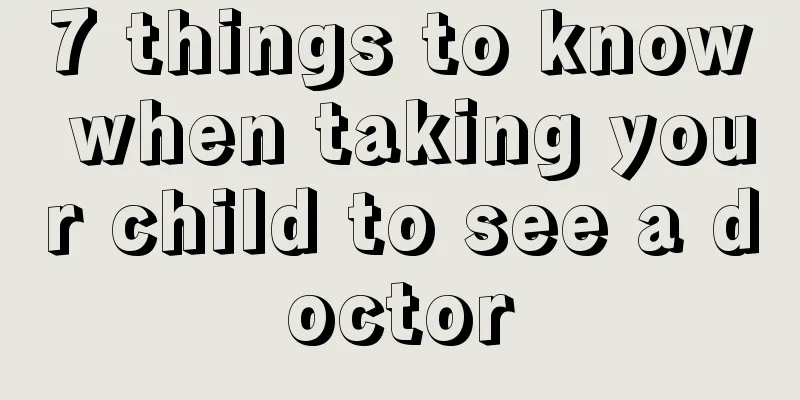7 things to know when taking your child to see a doctor

|
When a child is sick and goes to the hospital, what should parents say to the doctor? 1. Time The description of the child's onset time is very important. The onset time, interval time and deterioration time are of practical significance in distinguishing various diseases.
2. Body temperature If the child's temperature has been measured at home before seeing a doctor, you should explain when it was measured, how many times it was measured, and what the highest temperature was. You should also pay attention to whether the child's fever is regular or periodic, as well as the temperature difference between the palms, soles, and backs of the hands, whether there are convulsions during the fever, whether there is a rash on the body, and other symptoms.
3. Status When the child is ill, whether the limbs can move freely and whether the neck is stiff; whether the child is conscious, restless, crying, drowsy or lethargic; how severe the cough is, whether there is wheezing, whether there is phlegm, the color and consistency of the phlegm, etc.; whether the vomitus overflows or is sprayed out, etc. If the child has abdominal pain or diarrhea, the exact location of the abdominal pain, the onset time and duration of the pain, etc. should be clearly pointed out.
4. Diet Many diseases have varying degrees of impact on children's diet. Parents should explain to the doctor the increases and decreases in the child's diet, changes in the frequency of meals, and whether the child has feelings of hunger, fullness, anorexia, or food withdrawal, and explain whether the child has eaten unclean food, drank raw water, or eaten leftovers.
5. Urinary and fecal If your child has diarrhea, describe to the doctor in detail the frequency, amount, shape, nature, odor, etc. of the stool.
6. Sleep Sleeping time, sleeping status, whether it is normal sleep or drowsiness, cannot be awakened by shaking or calling, or cannot fall asleep at the slightest movement, whether there is screaming or crying during sleep, etc. 7. Medical history Tell the doctor everything, including the child's medical history and the medical history of family members. |
<<: Childhood obesity is harmful: Five strategies to prevent it
>>: Dear baby, there are seven tips to help you deal with excessive drooling
Recommend
What calcium supplements are good for a three and a half year old baby?
A three and a half year old baby needs a lot of c...
What to do if your baby is underweight
If your baby is underweight, it may be related to...
Reasons for baby's indigestion and diarrhea
We know that babies are prone to indigestion symp...
What to do if the newborn's eyes fall out
When the belly button of a newborn falls off, par...
How to lose weight when a child has a big belly? These methods are very effective
If a child has a big belly, it is mostly caused b...
What is the cause of high platelet count in children?
Children's bodies are relatively weak, so the...
How to deal with ascariasis in children
What is ascariasis in children? Children will hav...
How to make autumn health soup for children
In autumn and winter, one of the issues that peop...
1. What to do if a child over 1 year old has a cough
Every change in the baby after birth is watched b...
Why do children grind their teeth at night?
Children may have many abnormal reactions when sl...
Two month old baby's arm joints are cracking
We all know that babies of two months old are in ...
How is umbilical cord formed?
Simply put, umbilical polyp means that a child ha...
What to do if your child sweats profusely
Cold is a very common disease that can occur all ...
Why does a child have an enlarged heart?
When the baby is born, it can be said that he is ...
What medicine should children take for pharyngitis?
Because many parents do not know much about the d...









